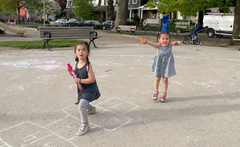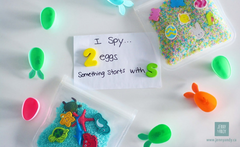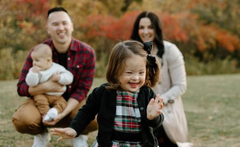
Your child is now becoming more independent and responsive to other children. During this time, your child will mature in many areas, including toilet training and participating in more organized games and sports.
She’ll also have mastered the basic rules of language and has built a large vocabulary that will continue to increase every day as she experiments with words.
With an increased vocabulary and independence, your three-year-old will now be more vocal about her wants and needs, especially during temper tantrums. Be prepared for your relationship to change dramatically as she is now able to view you as separate person with feelings and needs she’s beginning to understand.
Read about our personal experience with our "threenager".
Keep in Mind
Keep in mind that the actual age when a typically developing child reaches a milestone really can vary. Each child develops in their own unique way, so there's no need to worry unnecessarily if your child isn't hitting a milestone right away, especially if your child is hitting most milestones in other domains.
That being said, you are your child's best advocate. If there is an issue, it's always best to act early, so if you have any concerns about your child's development, please speak with your pediatrician.
Social and Emotional Milestones

At age three, your child will be much less selfish than she was at age two. She’ll also be less dependent on you, indicating that her own identity and sense of self is stronger and more secure. She’ll begin to play more cooperatively with children, rather than just playing side by side. And in the process, she’ll recognize that not everyone think exactly the same as she does and that different playmates will have their own unique qualities.
Three-year-olds spend much of their playtime in fantasy activity, which tends to be more cooperative than play that’s focused on toys or games. Your child may may enjoy assigning different roles to one another for an elaborate game of make-believe using imaginary or household items. This type of play helps children develop important social skills like taking turns,paying attention, communicating, and responding to one another’s actions.
Your three-year-old’s vivid fantasy life will help her explore and come to terms with a wide range of emotions, from love and dependency to anger, protest, and fear. Many three-year-olds also have imaginary friends, which is actually a very creative way to sample different activities, lines of conversation, behaviour, and emotions.
Back in real life, let your chid know that you’re proud of her new independence, skills, and creativity. Talk with her, listen to what she says, and show her that her opinions matter. Give her a sense of importance and help her make decisions by offering her choices whenever possible (i.e. food, clothes, activities and games, etc.).
Many children at this age:
- Are interested in new experiences
- Cooperate with other children
- May imagine unfamiliar images as "monsters"
- Sometimes cannot distinguish between fantasy and reality
- View self as a whole person involving body, mind, and feelings
Language & Communication Milestones

At this age, your child should have an active vocabulary of 300 or more words. She can use sentences of three or four words and imitate most adult speech sounds. Language allows her to express her thoughts, and the more advanced she is in speaking and understanding words, the more tools she’ll have for thinking, creating, and telling you about it.
Your three-year-old is still learning to master pronouns like “I”; “me”; “mine”; and “you”. She may often use her name instead of saying “I” or “me”. To minimize confusion, avoid correcting her and instead model correct pronoun use in your own speech.
At this stage, your child’s speech should be clear enough that even strangers can understand most of what she says, but may still mispronounce as much as half the speech sounds she uses. For example, it’s common for kids this age to use /w/ for /r/ (“wabbit”), /d/ for /th/ (“dis”; “dat”), or /t/ for any sounds she has trouble with. The sounds /b, p, m, w, h/ may emerge a little later on and may take some time for her to perfect them.
Many children at this age:
- Understand concepts of "same" and "different"
- Use five- to six-word sentences
- Tell stories
- Have an active vocabulary of 300 or more words
- Can follow three-part instructions
Cognitive Milestones

Your three-year-old will likely be very inquisitive, spending much of his time questioning everything that happens around him. She'll love to ask “Why do I have to…?” and she’ll pay very close attention to your answers as long as they’re simple and to the point. You shouldn’t feel the need to explain your rules fully.
When faced with specific learning challenges, your child’s reasoning skills are still rather one sided. She can’t yet see an issue from two angles or solve problems that require looking at more than one factor at the same time.
Your child’s sense of time will become much clearer during this period. She’ll know his own daily routine and understand that certain special events, like holidays and birthdays, only happen once in a while, although she will still have no real sense of the length of a year.
Many children at this age:
- Understand concepts of counting and may know some numbers
- Begin to have a clearer sense of time
- Can recall part of a story
- Engage in fantasy play
- Approach problems from a single point of view
Movement Milestones

At age three, your child is now quite agile, whether he’s going forward, backward, or up and down stairs. He uses a regular heel-toe motion, taking steps of the same length, width, and speed. He can also ride a tricycle easily.
But, not everything comes easily yet. He may still need to make a conscious effort when standing on her tiptoes, while getting up from a squatting position, or while catching a ball.
Your child is developing both the muscular control and the concentration he needs to master precise finger and hand movements. He will be able to move each finger independently and together like an adult. He’ll also be able to trace a square, copy a circle, and scribble freely.
Your child will also be very interested in learning what she can do with craft tools like scissors, paper, clay, paint, and crayons. He can now manipulate these objects and is beginning to experiment with using them to make his own creations.
Many children at this age:
- Can dress and undress themselves (may need help with buttons and zippers)
- Go up and down stairs without support
- Kick a ball forward
- Can throw a ball overhand
- Copy drawing circles and squares
- Use scissors
- Begin to copy some capital letters
Sensory Milestones

As a preschooler, your child should have a healthy attitude toward eating. Ideally, this includes no longer using eating (or not eating) to demonstrate defiance, nor does she confuse food with love or affection. She’ll now view eating as a natural response to hunger and meals as a pleasant social experience. However, it is still normal for children at this age to have specific preferences in food which may vary from day to day.
When it comes to bedtime, your child may feel some FOMO (fear of missing out), knowing that you and any older siblings are still up. These feelings are understandable, and there’s no harm in giving your child some flexibility, but remember that most children at this age need at least ten to twelve hours of sleep every night.
Most preschoolers sleep through the night, but some may wake several times to check their surroundings before falking back to sleep. There may be some nights when your child’s active dreams wake him. These vivid dreams may reflect some impulse or inner fears that comes to surface by way of dreams. He’ll be better able to understand that these are only dreams when he’s a little older, usually by age five or six.
Many children at this age:
- View eating as a natural response to hunger
- Need ten to twelve hours of sleep each night
Want a handy milestones checklist all in one place?
Download our Comprehensive Developmental Milestones Checklist PDF for free ☑️!
Developmental Milestones By Age
Sources:
- American Academy of Pediatrics. Caring for Your Baby and Young Child, 7th Edition: Birth to Age 5, Fifth Edition. 2009.



